Looking for the best online learning platforms? You’re in the right place.
Teaching an online course is one of the best ways to develop a profitable business online.
While creating an online store is still a popular option for those wanting to get involved in digital sales, online leaning is gaining steam at a rapid pace. The market is currently valued at around $190 billion USD, with an annual growth rate of 7%!
Unfortunately, just having the knowledge that your customers want to share isn’t enough. You need a way to cultivate that knowledge and place it in an environment where your clients can take advantage of it. That’s where online learning platforms come in.
Today’s online learning platforms give you the tools that you need to not only share your knowledge but engage your students too.
We’re going to be examining some of the best online learning tools you can access today, when you want to make your voice heard.
What Makes an Online Learning Platform Great?
Before we jump into our reviews, let’s examine some of the key features of an online learning tool. There are plenty of different options out there if you type a search into Google, from Udemy and Skillshare, to Coursera and Teachable.
But, how do all those options perform when it comes to teaching your audience new skills?
Top Online Learning Platforms
The following platforms aren’t really designed for course creation purposes. Although you may be able to partner with the companies if you’re already involved with a huge learning institution like Stanford, these solutions are more for students than teachers.
Best Online Learning Platforms: Coursera
Coursera is one of the best online learning solutions for those who want to learn about things like STEM and data science. Originally, the service was designed to focus on science, engineering, technology, and math. Now, of course, there are hundreds of courses available in many different fields. The company collaborates with hundreds of leading companies and learning institutions, making it a big name in the industry.
The thing that makes Coursera different to the other tools that we’ve looked at so far, is that it doesn’t allow you to build and host your own online course experience with all the custom branding you like. Instead, you join a community and submit your courses into
Getting involved with Coursera as a creator is often very difficult. You have to approach the company as part of a business or online learning facility. However, the good news is that there are plenty of ways to learn on Coursera if you want to upgrade your knowledge.
LinkedIn Learning is another fantastic course marketplace tailored to help business professionals accelerate and improve their skills. You can’t be an online educator on this platform, but you can learn a lot. There are more than 1,000 business courses to choose from, on leading topics from project management, to web development.
Best Online Learning Platforms: LinkedIn Learning (formerly Lynda.com)
LinkedIn Learning is another fantastic course marketplace tailored to help business professionals accelerate and improve their skills. You can’t be an online educator on this platform, but you can learn a lot. There are more than 1,000 business courses to choose from, on leading topics from project management, to web development.
Linkedin Learning used to be known as Lynda, one of the leading solutions for digital learning on the web. The company stands out by offering an easy-to-access environment for students. What’s more, you can earn certificates that you add directly to your LinkedIn Profile. If you’re looking for a way to increase the value of your resume, LinkedIn Learning can help.
Best Online Learning Platforms: Skillshare
Skillshare is another solution for online education that takes a slightly different approach to sharing content online. If you’re looking to teach your craft online, you can sign up to SkillShare for free and start crafting various unique course experiences.
One point worth noting is that if you do want to be paid for your Skillshare courses, then you need to make sure that your lessons are part of the Skillshare premium catalog. Anyone can sign up and share a course with their friends and colleagues, but you can only start earning money in the premium environment. The good news is that paying for a premium class is often quite affordable. You’ll get money for premium membership referrals and royalties for the minutes watched of your lessons.
Most Skillshare classes include video lessons, community discussions and projects. Rather than focusing on certificates and final outcomes, Skillshare is all about sharing their progress and gaining feedback. This is great if you’re involved in the creative environment.
Unfortunately, the earning potential of Skillshare is quite limited, so you’re probably not going to make a fortune if you’re using this platform.
Pricing: Free to get started, but your earning potential is very small too.
Best Online Learning Platforms: EDX
EDX is another course solution that’s similar in style to Coursera. It hosts a lot of premium and free online courses that are designed for dedicated academics. EDX offers plenty of ways for customers to consume educational materials, from XSeries programs that get to the heart of specific subjects, to various professional certification programs.
Compared to some of the other solutions on the marketplace for online learning, the EdX experience does come across as a little simple and low-tech. However, it’s very clear to see how authoritative this website is. There are plenty of trust badges on the site showing that there are educators here from Berkeley, Harvard, and more.
Like Coursera, it’s not really possible to launch a course on EDX unless you’re part of a learning institution. However, you can access the EdX for business platform that allows you to teach and train other team members in your community. This could be a good option if you’re looking for a new learning solution that doesn’t involve in-person instruction for your company.
Pricing: Not much of an option for course creators as Edx will only work with other leading educators.
Best Online Learning Platforms: MOOC
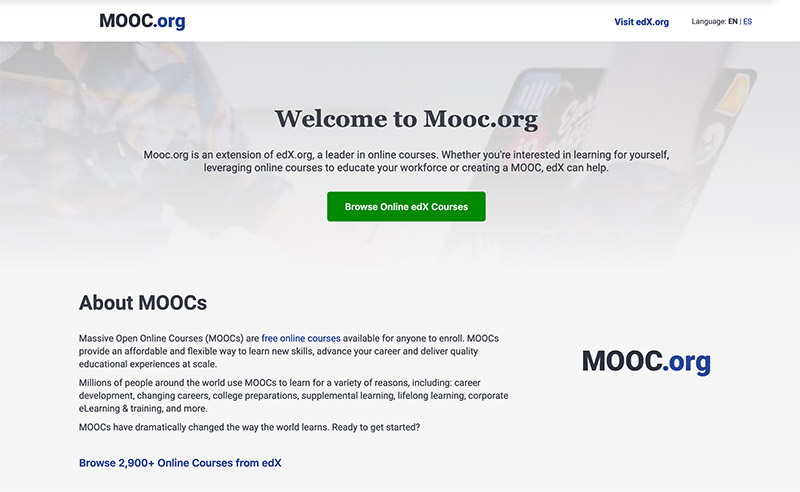
On the other side of the coin to EDX.org is Mooc.org.
Massive Open Online Courses is a term often used to refer to free online learning opportunities that anyone can enroll to online. However, there’s also a company called Mooc.org that works as an extension of EdX. This solution basically provides a slightly different learning experience for Edx, with flexible tools for growth.
Once again, this isn’t much of an option for course creators, but you can use MOOC to discover things like professional certificates and online master’s degrees if you want to expand your skills.
Best Online Learning Platforms: Udacity
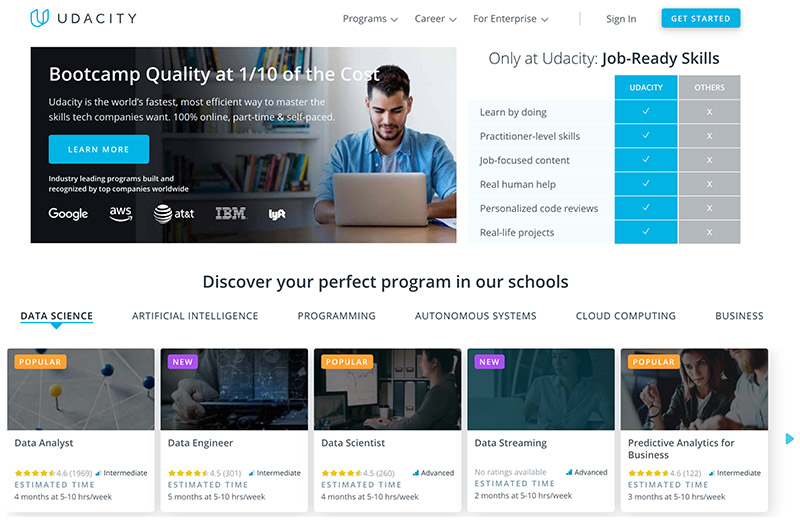
Udacity comes to us from the Silicon Valley environment, distinguished by reputable partnerships with Google and other tech giants. There’s a huge emphasis here on cutting-edge topics and learning about machine learning, deep learning, artificial intelligence and other disruptive tech.
While there are a lot of different ways to learn on Udacity, you can’t launch your own online courses on the platform, which is a shame for course creators. This means that we can only really recommend this course solution as an educational environment for learners.
Best Online Learning Platforms: Docebo
Docebo is another LMS that’s suitable for partners only. You can access Docebo for a low price, starting at around $3.33 per user per month. However, that’s only for education purposes. If you want to launch your own learning solution through Docebo, then you have to partner with the brand.
One good thing about Docebo for business owners that want to access training for their teams, is that the service is packed full of things like gamification and community collaboration. There’s also a wide range of third-party integrations to explore.
Best Online Course Platforms
Let’s continue by looking at some of the biggest course creation tools available on the market today.
Teachable
Teachable is probably one of the most popular learning platforms ever to appear in the digital education landscape. The solution was initially created to address the problems that people saw with other basic online learning marketplaces, like limited branding, for instance.
Because of that, Teachable comes with plenty of options to make customizing your website easier. You can eliminate some of the more common cookie-cutter templates that come with options like Udemy. Multi-language support is a plus for Teachable, as is the fact that you can access things like SEO, discussion forums, quizzes, and more. Engaging your audience is a breeze.
Other features of Teachable include a drag-and-drop builder for your course delivery solution, support for a huge selection of files, and more.
Best for: Teachable is ideal for those who want access to fantastic course creation features at a low price. The monthly rates are very reasonable, particularly when you consider all the amazing features built-in. Additionally, marketing and analytics are great too. There’s even integration available with things like Ontraport, Mailchimp, and loads of ecommerce tools too.
Pricing: Starts at $29 per month for the smaller package and goes all the way up to $299 per month depending on what you need. A free plan is also availablebut it's limited to 10 students
Read the full Teachable review here.
Podia
Podia is a solution designed for helping to construct a site with as little work and effort as possible. It’s meant for constructing your learning experience in the area of digital downloads, online courses, or selling memberships.
If you don’t want to worry about things like ecommerce and selling from a traditional perspective, then Podia could be just the thing for you. It comes with a clean and easy-to-use interface, as well as a range of options to help you customize your site. Podia is simple for beginners, but it also has very limited functionality when it comes to advanced tools.
Best for: The Podia experience is ideal for anyone who have found Gumroad and other competitors in the learning environment to be too complicated or too costly. Podia makes sharing knowledge online as simple as possible.
Pricing: Podia’s pricing is pretty simple, with the Mover package for $39 per month, or the Shaker option for $79 per month.
Read our full Podia review.
Thinkific
Thinkific delivers an excellent experience compared to other course creation platforms for a few reasons. First and foremost, it’s course designer is one of the most advanced on the market today. If you’re not much of a coding expert, or you haven’t used code before, Thinkific is a good choice.
All the content that you need to build a successful “education empire” as the company calls it, is available through a drag-and-drop editor. You can add your own branding to the mix, which is great for building a name for yourself online.
For engaging your audience, there are a host of fabulous features like downloads, quizzes, surveys, discussions, and more. Additionally, unlike many competing online course platforms, the Thinkific solution is available to access for free at first.
Best for: If you’re looking for a way to design a new learning experience from scratch, Thinkific is the tool for you. With plenty of awesome features for engagement, and a handful of customization tools too, Thinkific is a great choice for any business owner.
Pricing: There’s a free option available to get you started, or you can pay for the basic platform at $49 per month. There’s also a pro platform for $99 per month, or premier for $499 per month. If you need extra features, you can get add-ons like the Growth package, or Thinkific Plus.
Read our full Thinkific review.
Academy of Mine
Another brilliant online learning solution, Academy of Mine allows users to access an all-in-one solution for a self-branded online course experience. You don’t need to settle for any one-size-fits-all experiences with Academy of Mine. One of the things that makes this solution so high-quality is that you can really get in deep with your customization options.
If you need some help getting started, there’s the option to select a fully-hosted template complete with galleries, landing pages, and offer pages. Academy of Mine is a solid choice, since the solution comes with a complete course creation and learning management offering. There’s also the option to accept PayPal and credit cards when selling your courses.
If you want to boost your chances of earning learners, then there are various marketing features available from Academy too, like affiliate programs and email marketing.
Best for: The Academy of Mine solution comes with a complete learning management system, or LMS, so you really do get everything you need to create massive open online courses. If you’re selling your course content up-front and you want to make sure that you have your brand front and center, Academy of Mine can help with that. However, pricing is pretty high.
Pricing: Prices start at $499 per month, although you do get two months free if you pay annually. Additionally, there’s a “professional” plan for $899 per month with some extra development hours and features included. If you need a higher level plan, then you’ll need to contact the team for a quote.
Teachery
Teachery is another online learning platform that’s all about making online selling as simple and seamless as possible. With this amazing service, you can build and sell your online courses with no fees whatsoever. Which is a huge bonus. The lack of a transaction fee means that you can focus more on building your sales strategy as much as possible.
Teachery comes with a bunch of features to get you started, including access to unlimited courses, lessons, and student access. There’s also the option to duplicate existing courses with the touch of a button, and make changes using the live course editor built into the platform.
As well as uploading PDF text and other content into your course, you can also embed video, audio, images, and slide presentations. However, Teachery doesn’t host your video, audio and other content for you
Best for: Anyone who is serious about selling courses online will love the range of great tools that come from Teachery. You’ll have a lot of functionality on this platform, and you won’t have to worry about transaction fees dragging down your earning potential.
Pricing: The price for Teachery starts at around $49 per month, or $470 per year. It’s the most straightforward pricing we’ve seen.
Read the full Teachery review here.
Ruzuku
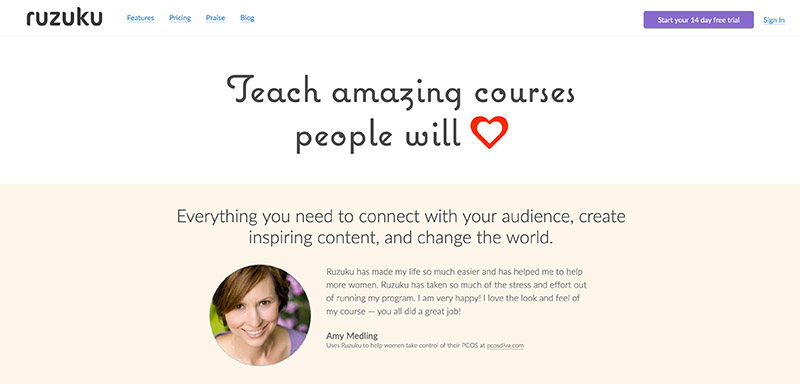
Ruzuku is another leading online course solution that’s packed full of amazing functionality. To begin with, the course management for this service is quick and easy to get your head around. You can upload virtually any kind of learning materials for selling to your customers fast. You can also help your customers to track their achievements in your online education platforms with certificates and course milestones.
One thing we particularly like about Ruzuku is the fact that you can give your customers a chance to really engage with their community. As they’re progressing through the learning paths you set up for them, your students can connect with other online learners on forums and in chat.
What’s more, to help enhance your engagement strategies, you can integrate Ruzuku with email marketing tools like Mailchimp and set up automated emails to notify your customers about what’s coming up next.
Best for: This is one of the best online learning platforms for those who want to connect with their learners on a deeper level. Various kinds of media are supported on the Ruzuku platform, and you can run webinars however you like. Ruzuku is also good for delivering drip content based on different timing schedules. You don’t even need a lot of technical knowledge to get started.
Pricing: Ruzuku’s pricing starts at around $74.75 per month for the lower tier and goes up to $125 if you pay annually. You’ll pay a little extra if you’re using a monthly plan.
Read our full Ruzuku review.
Udemy
Udemy is probably one of the most popular solutions we’ve seen online when it comes to selling learning courses. The solution has mixed reviews online, probably because of the huge amount you pay in fees to Udemy to help you attract customers to your online classes.
However, while there is a big fee to think about, it’s also worth noting that the Udemy online education network is unmatched for attracting opportunities for sales. If you’re keen to get your subject matter experts heard online, then this could be one of the best online course platforms for you.
With Udemy, you can build an online course using all the different kinds of media that you like. However, you need to keep in mind that Udemy will keep up to 50% of your revenue when they help to promote the course you create to another student. However, if you earn students without Udemy’s help, then you keep the profits.
Best for: If you’re uncertain about building a website and selling your courses from scratch, then Udemy might be a better choice for you. You’ll lose some of your earnings if you rely heavily on Udemy’s help, but you can get a massive boost to your online presence with this service.
Pricing: The Udemy platform is free to use (it’s a learning marketplace), however you will pay up to 50% of your sales to Udemy for every student the company helps you earn.
Read our full Udemy review.
Kajabi
Kajabi is another truly market-leading tool in the world of online course creation. If you’re looking for the best online learning platforms, but you also want something that will help when it comes to creating sales funnels and landing pages, then Kajabi is the option for you.
Perfect for those who want extra help converting their leads into paying customers, Kajabi offers everything from email marketing campaigns managed from within your dashboard, to integrations with leading services like Active Campaign and MailChimp.
Kajabi also offers a pretty solid blogging platform. It’s not as great as WordPress, for instance, but it does offer a lot of functionality compared to some of the other blogging tools available from online learning platforms around the web.
Best for: Kajabi is a top choice for anyone in need of a sophisticated online learning solution. Appealing to solopreneurs, coaches, and speakers alike, Kajabi has plenty of amazing potential to offer, and it’s available for a relatively reasonably price too. Additionally, Kajabi is surprisingly beginner friendly. You don’t need to become a code expert to get started. There are templates to help you deliver everything from evergreen training to membership products.
Pricing: Prices do start at around $119 per month, which makes Kajabi one of the more expensive options on the market right now. However, it’s worth noting that Kajabi can stop you from needing to access extra features and tools elsewhere, saving you money in that regard.
Read our full Kajabi review.
WizIQ
WizIQ is an easy-to-use and affordable solution to classroom and LMS software. Designed to make online course creation easy, WizIQ comes with access to everything from tests and assessments for your customers, to eCommerce functionality and in-depth analytics.
With WizIQ you can create MOOCs to boost your revenue stream, enrolling students from around the world and creating new sources of cash. There’s also the option to deliver live training, learning on the go through smartphone apps, and so much more. You can create and sell your online courses through a complete system, or you can run a virtual classroom, which is great for things like teaching internal coworkers and partners. While this solution has a lot of the market-leading tools that we’ve covered looking at other leading platforms, it’s the little extras that make WizIQ stand out.
Things like the ability to deliver course content through smartphones and use an interactive whiteboard to demonstrate your knowledge to students are amazing. There are also plenty of ways to engage with your students through chat, forums, and polling.
Best for: WizIQ is ideal for the modern course creator that wants to stay ahead of the curve. You can access all the functionality that you need with this solution to tutor customers online, train your partners, and so much more. Additionally, because the service comes with a free plan, that means that it’s very easy to get started.
Pricing: There’s a free plan available with the basics, or you can have a free trial and see how you feel with the software first. The average plan starts at $83 per month, which is quite reasonable for a premium service.
Learndash
Learndash is a popular online course platform that’s constantly growing in features and functionality. Used by countless major universities and Fortune 500 companies, Learndash delivers plenty of functionality and speed to course creators. The platform includes many of the tools associated with a traditional online learning site, including content dripping, rewarding learners and more.
The pricing for Learndash is delivered on an annual basis, which means that it comes with some discounts, but it also leaves you quite “locked in” to the environment. Learndash supports professional training opportunities, higher education, WordPress projects, and more. You can even deliver certificates and badges to learners and access a range of engagement triggers to interact with your customers.
One point to note about Learndash is that it is available as a kind of WordPress LMS plugin, which means that you can embed it into your existing WordPress website. If you’ve already started to build your presence online and you don’t want to start again from scratch, this could make Learndash a more attractive option for you.
Pricing: The pricing starts at around $159 per year for one website. If you want to upgrade and have more websites to play with, then you can pay $189 for 10 sites, which is quite a reasonable price bump. Unfortunately, there isn’t a free trial to get you started, so it’s hard to test the functionality of this service before you hand over your cash.
What Are Online Course Platforms?
An online course platform can be difficult to define in today’s landscape. Some people see online course platforms as the websites that are packed full of learning opportunities like Coursera.com, or Udemy. Other people think that course learning platforms are LMS or learning management systems, which are intended for people who want to share their knowledge with the world.
Tools like Kajabi, Teachable, Thinkific, and Podia are all excellent for course creators. On the other hand, Coursera, LinkedIn Learning, and EDX are more intended for people who are looking for quick ways to learn and build their skills online.
If you want to create a course and earn cash from your educational solutions, then you need to be willing to find the best LMS platform, complete with eCommerce and membership capabilities. If you can get things like marketing and excellent customer support thrown in, then that could be very helpful too.
How do I Create and Sell Online Courses?
If the reason that you’re interested in things like open source education platforms, rather than learning tools like Khan Academy and Codecademy, is that you want to sell courses, you need a plan.
Start by thinking about what your students actually want to learn. You can check out places like Quora and Reddit for inspiration, or even just see what people are talking about in your industry using social media and hashtags. Remember, you’ll need to focus on a topic that you’re already knowledgeable in, so you can take advantage of your skills.
Once you know what your students want to learn:
- Choose the best online learning platforms for you: You can use the guidance above to find an online learning platform that offers the right tools for the right price. Remember, the more in-depth you want to go with your online education environment, the more you may need to pay. Be sure to think about the kind of features that you want, from email automation and market research, to webinar software and promotional tools.
- Find the right software and equipment: Creating a course takes time and effort. You need to create amazing content that’s going to engage and inform your students. That means investing in a good microphone and video system so that you can record your courses. You may also need to look into things like software for editing your videos, or presentation tools for slides and powerpoints. If you’re going to be presenting live, and you might want to use the same information again later, look into a screen recording service.
- Create your valuable content: Make sure that you know exactly what kind of education you’re going to offer, and which audience you’re speaking to. Understanding your students will give you a better insight into the kind of language that you need to use to reach them. Make sure that you address any pain points your audience has, and get in-depth with your education. Don’t just scratch the surface.
- Engage your audience: One of the most important things you can look for in the best learning platforms, is tools that will help you to engage your audience. You need to interact with your learners to keep them excited. This could mean running polls and quizzes, or delivering live webinars from time to time. It also helps if you can reward your learners with certificates and badges too.
- Deliver a great experience: Even if you have valuable information to share with the world, it’s worth noting that there’s a lot of competition out there. You need to deliver the best possible learning experience if you want your audience to stick with you. To make sure that you’re moving in the right direction, looking for a learning platform that integrates with external tools. Keeping track of your performance with things like Google analytics will help you to plan future lessons.
- Make your brand stand out: You won’t be able to do much of this if you’re using a learning platform that just places your course on a marketplace. However, if you’re using a full LMS system, you can go in-depth with your branding. Make sure that your colors and logo stand out where they need to. Your brand will help to differentiate from other competitors in your industry.
- Promote your courses: Just as you need to promote an ecommerce store or blog, you also need to attract people to your online courses. Ideally, your online learning platform will integrate with email marketing and social media tools so you can nurture leads. However, you can use other methods to promote your courses too, like designing your own website, blogging, and more.
Remember, if you need a little extra help getting started with your online course creation, many of the leading platforms available today come with knowledge bases.
Check out the blogs and documentation available online from your platform provider. Don’t forget to get involved in community forums for educators too.
Making the Most of Online Learning
The online learning industry is growing at a rapid pace.
Today, you can make a profit teaching students about everything from computer science to javascript. However, you’re going to need the right online platforms to get you started.
Just as you need an ecommerce platform for your online store, you’re going to need the right learning management system for your digital education venture.
There are plenty of different options out there, from those with high-quality partnerships with Stanford and Harvard, to tools that allow you to teach through something as simple as a mobile app. The key to success is finding something that appeals to your individual needs, without forcing you to learn everything there is to know about web development.
Remember, while each platform has its pros and cons to consider, the most important factor is you. The success of your course will depend heavily on the quality of the content that you can share, and how you market yourself. Choosing the best online learning platforms is just the first step.


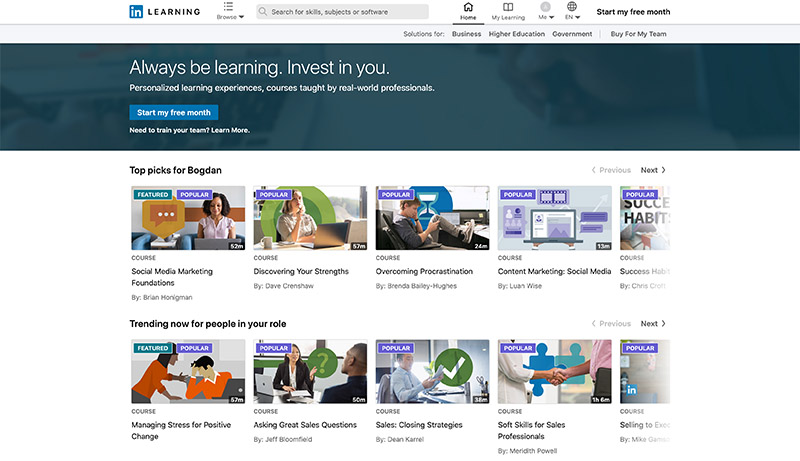
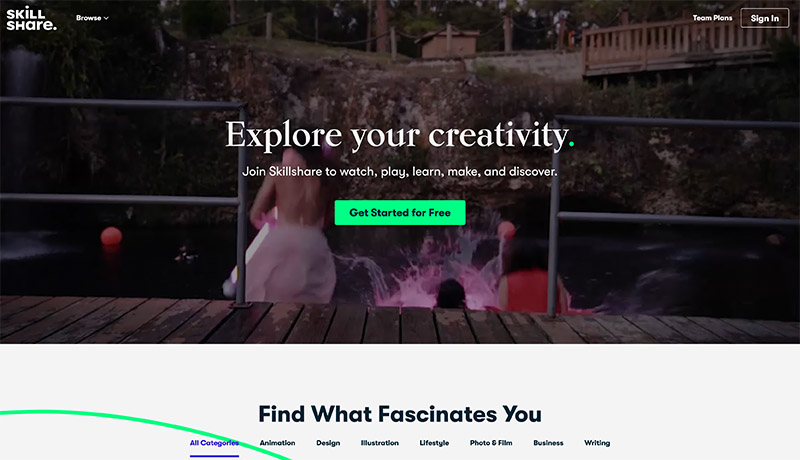
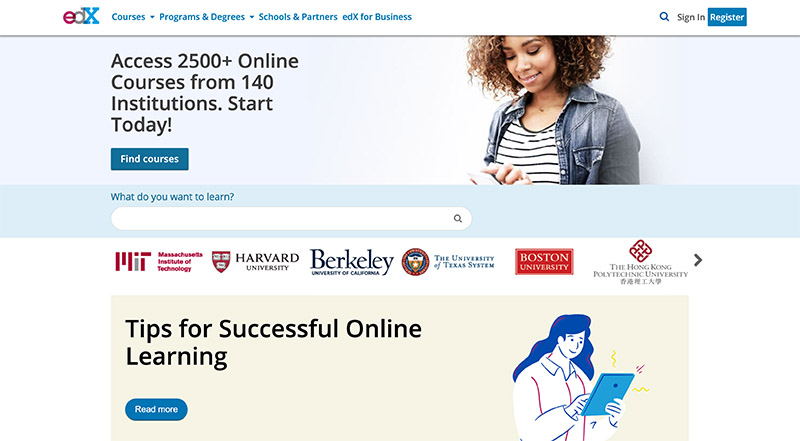
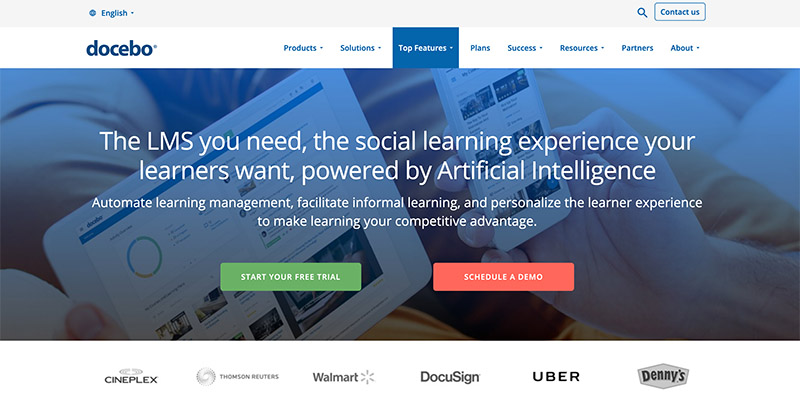
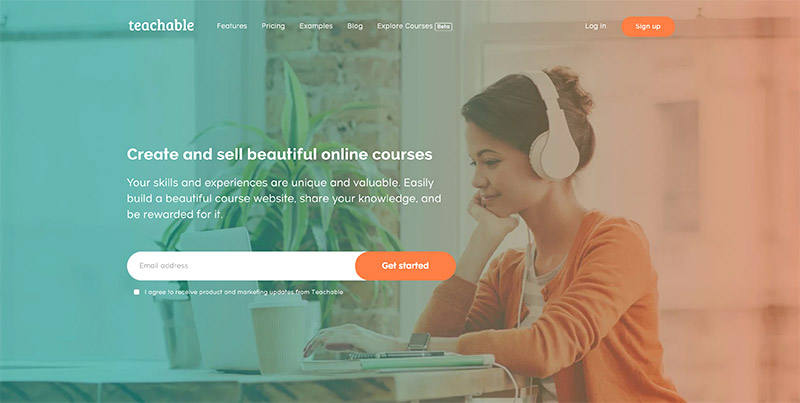
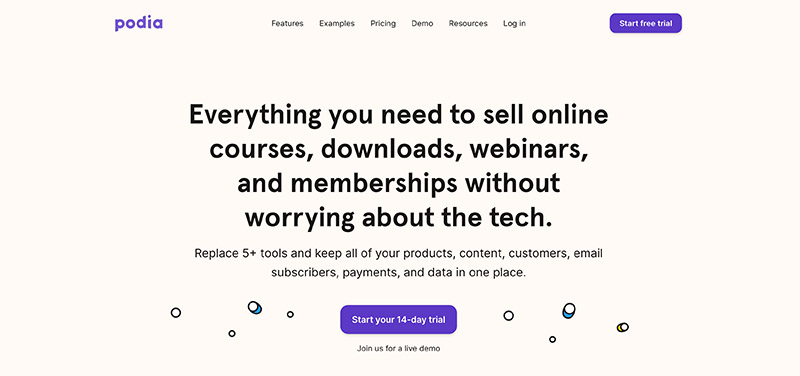
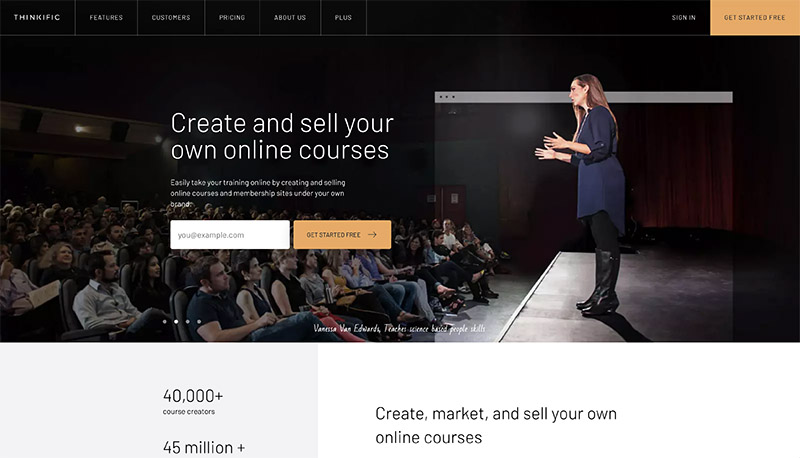
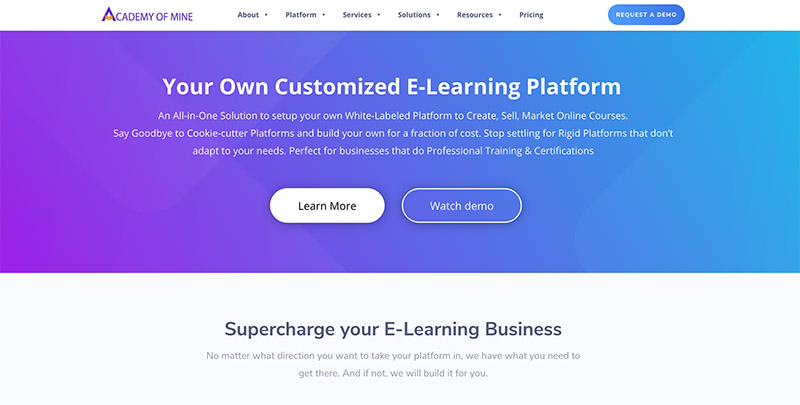
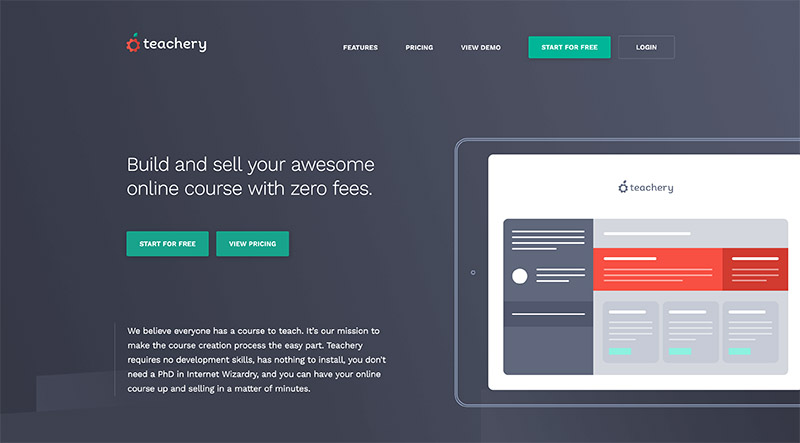

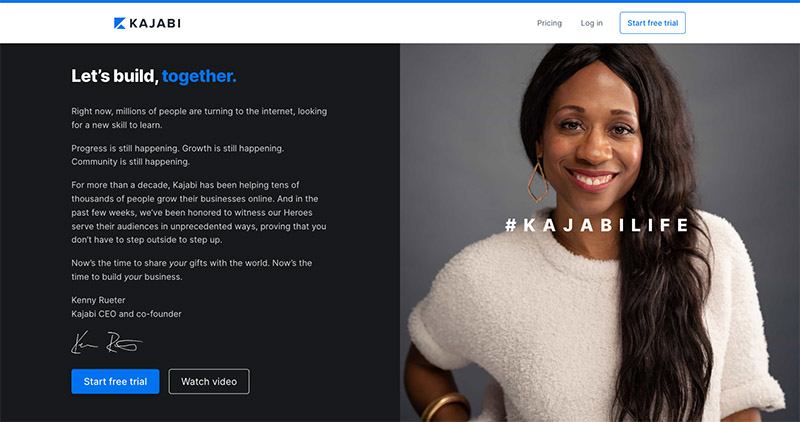
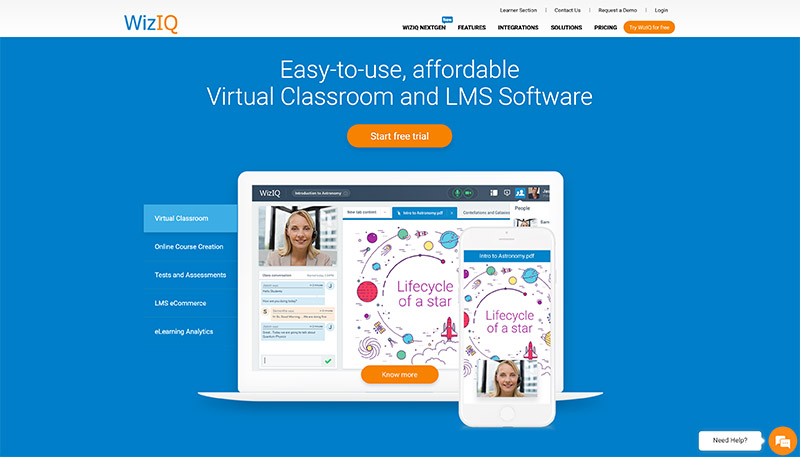
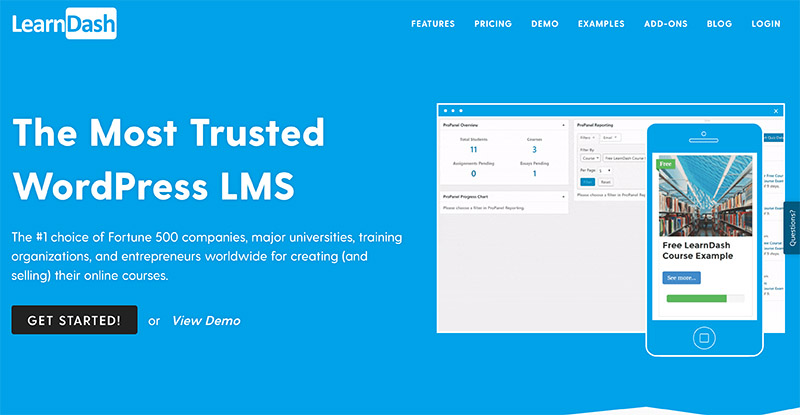
Thank you for the knowledge given here
You’re welcome Adi!